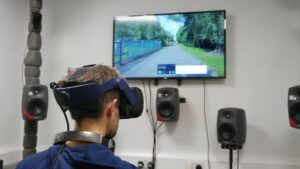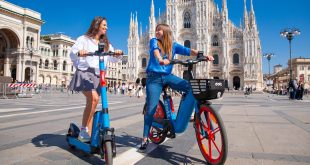Micromobility provider Dott has begun virtual reality testing of its e-scooter warning sounds, in partnership with the Royal National Institute for Blind people (RNIB).
Dott, based in the Netherlands, is hoping to develop an e-scooter sound that will alert other road users to their presence, without contributing to noise pollution.
The brand is now working with the University of Salford and the RNIB to test three potential sounds, by asking participants to wear a virtual reality headset to simulate pedestrians with e-scooters being ridden around them in different scenarios.
The test group, including blind and partially sighted, will be asked to identify when they are first aware of the e-scooter, and provide feedback on the suitability and preference of the three sounds.
Dr Antonio J Torija Martinez, principal investigator at the University of Salford, said: “We are testing a series of carefully designed e-scooter sounds to find the right balance between maximum vehicle noticeability and minimum noise pollution. Using virtual reality to create immersive and realistic scenarios, in a safe and controlled laboratory environment, will allow us to achieve robust results. By working closely with the RNIB and blind associations across Europe, we can ensure that the sound we develop is the best fit for their needs.”
The tests will take place in a laboratory in London, before being repeated in Italy, Sweden and Spain in collaboration with blind associations across Europe. The trials in different countries will ensure international relevance with the aim of creating a global standard for an e-scooter sound.
Robin Spinks, RNIB head of inclusive design, said: “Light electric vehicles emit virtually no sound. Imagine for a second how terrifying this could be if they are used irresponsibly for someone with little or no sight. We’re working with multiple stakeholders across the transport industry to bring about sustainable improvements in safety, perceivability and awareness. Operators, researchers, and regulators must all collaborate to assure a more inclusive urban environment for all.”
Dott is one of the brands, along with Lime and Tier, working to develop a universal sound to alert partially sighted pedestrians of approaching e-scooters.

The impact of e-scooters, and particularly their lack of approaching sound, is a major concern to disability campaigners about the adoption of micromobility technology in urban spaces.
Henri Moissinac, co-founder and CEO of Dott, said: “Our vehicles are transforming cities by providing efficient transport which is free from both air and noise pollution. It’s important that our vehicles not only work for our users, but are respectful to all other city residents. The development of an industry standard e-scooter sound, which can be detected by those that need it but without being intrusive, could greatly improve the experience for some of the most vulnerable road users.”
Micromobility provider Dott has begun virtual reality testing of its e-scooter warning sounds, in partnership with the Royal National Institute for Blind people (RNIB).
Dott, based in the Netherlands, is hoping to develop an e-scooter sound that will alert other road users to their presence, without contributing to noise pollution.
The brand is now working with the University of Salford and the RNIB to test three potential sounds, by asking participants to wear a virtual reality headset to simulate pedestrians with e-scooters being ridden around them in different scenarios.
The test group,, including blind and partially sighted, will be asked to identify when they are first aware of the e-scooter, and provide feedback on the suitability and preference of the three sounds.
Dr Antonio J Torija Martinez, principal investigator at the University of Salford, said: “We are testing a series of carefully designed e-scooter sounds to find the right balance between maximum vehicle noticeability and minimum noise pollution. Using virtual reality to create immersive and realistic scenarios, in a safe and controlled laboratory environment, will allow us to achieve robust results. By working closely with the RNIB and blind associations across Europe, we can ensure that the sound we develop is the best fit for their needs.”
The tests will take place in a laboratory in London, before being repeated in Italy, Sweden and Spain in collaboration with blind associations across Europe. The trials in different countries will ensure international relevance with the aim of creating a global standard for an e-scooter sound.
Robin Spinks, RNIB head of inclusive design, said: “Light electric vehicles emit virtually no sound. Imagine for a second how terrifying this could be if they are used irresponsibly for someone with little or no sight. We’re working with multiple stakeholders across the transport industry to bring about sustainable improvements in safety, perceivability and awareness. Operators, researchers, and regulators must all collaborate to assure a more inclusive urban environment for all.”
Dott is one of the brands, along with Lime and Tier, working to develop a universal sound to alert partially sighted pedestrians of approaching e-scooters.
The impact of e-scooters, and particularly their lack of approaching sound, is a major concern to disability campaigners about the adoption of micromobility technology in urban spaces.
Read more: Mate.Bike launches ‘SUV’ e-cargo bike
Henri Moissinac, co-founder and CEO of Dott, said: “Our vehicles are transforming cities by providing efficient transport which is free from both air and noise pollution. It’s important that our vehicles not only work for our users, but are respectful to all other city residents. The development of an industry standard e-scooter sound, which can be detected by those that need it but without being intrusive, could greatly improve the experience for some of the most vulnerable road users.”
 micromobilitybiz Delivering news updates to the micromobility industry, focusing on e-bikes, e-scooters and green transport
micromobilitybiz Delivering news updates to the micromobility industry, focusing on e-bikes, e-scooters and green transport




